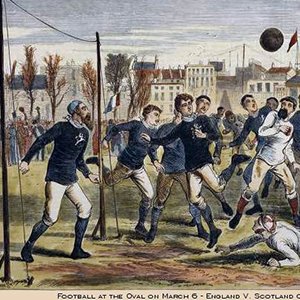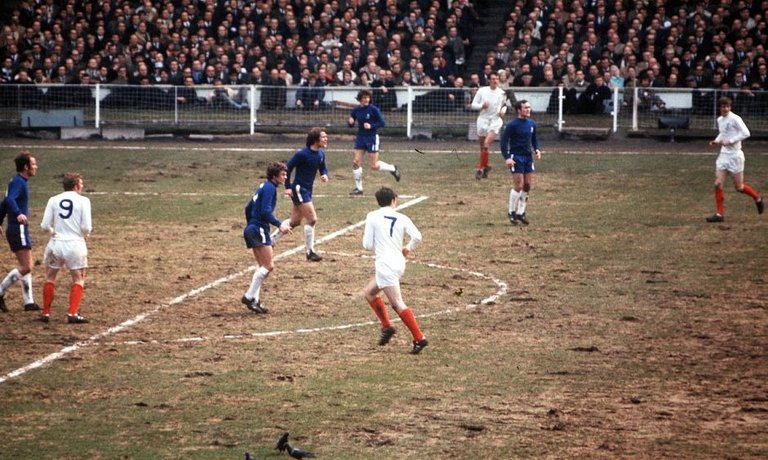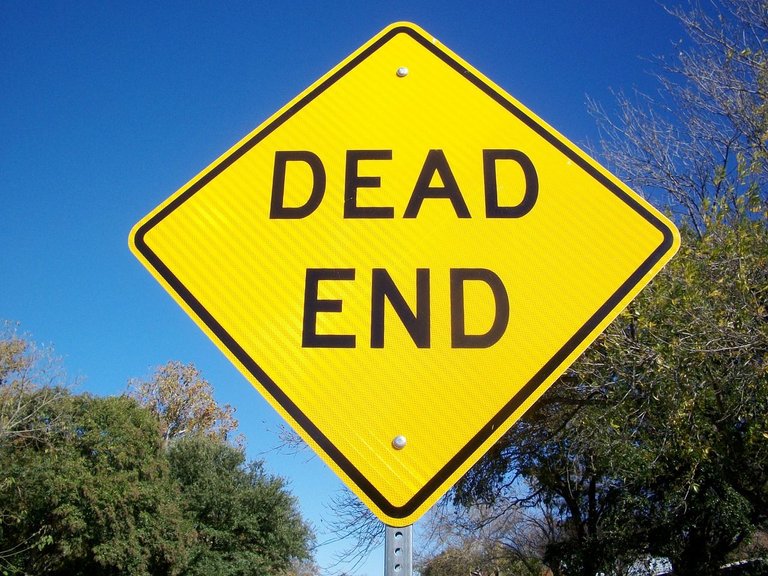Sport and The End of History
In his 1992 book 'The End of History and the Last Man', political scientist Francis Fukayama argues that the West's victory over the Soviet Union in the early 90s didn't so much mark an end to the Cold War (recent events seem to suggest he's right on that point!) but instead effectively signals the end of mankind's history.
History, he argues, has up until this point in time been defined by competing ideologies and given that liberal democracy has just delivered a coup de grâce against the last remaining opposition to its global dominance (communism) then we are all headed towards a universal way of ordering our societies. By definition then, history has ended.
This blog is part of the #sportingtrends series, so I won't get bogged down in critiquing Fukayama's arguments although if you really feel inclined to talk about them then I'm happy to do so in the comments section. Instead, I'll be considering whether it's time to draw similar conclusions about the world of sport?
For so long the sporting contests we love to watch have been defined by competing tactics and strategies which have often been drawn along club and/or national boundaries. With all major sports now becoming or looking to become truly global games it's tempting to suggest that this won't be the way of things for much longer (if it hasn't changed already) and begs the question...
Is this the end of history for sport?
In many ways this is a good follow-up to one of my recent blogs, The Premier League, a true league of nations and the next evolutionary step towards a European Super League as well as the series of posts by @amirtheawesome1 on tactics in football and the role of the manager.
I won't just focus on football in this blog but as the only sport that can really be termed as global in its outreach it does seem like a good place to start.
Certainly over the last couple of decades the fluidity with which players and indeed coaches have moved around the world is creating universal trends in tactics and general thinking about the game.
Cast your mind back just 20 years ago and the top nations that played football were seen very differently. England for example would be a long-ball team whose tactics favoured brawn over brains, The Italians were the masters of defence, The Brazilians were the kings of creativity and flair, while the Germans were all organisation and efficiency. These are of course stereotypes so we should be hesitant to draw absolute conclusions from them but at the same time they are based on elements of fact.
The world of football used to be far more secular in its approach to the game but in recent years and as a result of players and coaches mixing freely across its top leagues, the trend has been towards just 2 or 3 distinct styles of play that have been adopted by teams across the globe.
The high press for example is very in vogue at the moment, the use of inverted wingers whether as part of a 4-2-3-1 or 3-4-3 system is almost universal and a desire to play out from the back has meant that defenders are now judged more on the quality of their skills on the ball than actually being able to defender.
If we were to look on a more granular level we would find differences when comparing teams as much as anything because human beings aren't robots and variations in players' skills and physical attributes produce different results. All the same, the differences in overall style of play has become less and less pronounced in recent years.
What is causing this trend towards universally accepted styles of play?
Let's start with the obvious, success! Teams have and always will adopt successful tactics leading to the formation of specific trends in sport. That much is true and always will be but within the 21st century the flow of ideas across traditional boundaries described above coupled with the importance of data and sports analysis is changing modern sports.
Every sport in every country has become increasingly reliant on data to inform its decision making. In 2020, the sports analysis industry was estimated to be worth just over a $1 billion USD. By 2025 it's estimated that it will be worth in excess of $5 billion source
Data can of course be interrupted in different ways but it is far less susceptible to interference by the kind of cultural factors that once dictated tactics and styles of play in sport and the increased importance that is being placed on numbers is seeing teams across all sports change their style of play often towards a commonly perceived 'best model' for success.
How often have you heard sports fans and pundits alike comment that a team has moved away from a traditional style of play or that this isn't the (insert team name) way of doing things?
These are meaningless sentiments within modern sport. Big data does't factor in these unquantifiable elements and so they are ignored leading to an ever increasing trend towards universal outcomes as a result of evidence based analysis.
Even where it can be argued that analysis of data produces a variety of potential models for success, it's unlikely that those models will ever be truly new given data analysts reliance on past results. Trends in sport therefore are increasingly just revamps of past ideas as opposed to anything genuinely creative and remind me a bit of the South Park episode 'Simpsons Already Did It' where the regular characters come to terms with the fact that there are no truly new ideas...
Ultimately though trends in sport are driven by more than just a desire to be successful on the pitch. We live in a world where there is so much competition for our attention and our money that sport has to develop along lines that will appeal to consumers across the globe.
We increasingly see that trends in sport are dictated as much by market analysis as they are by pure sports analysis.
Cricket over the last 20-years would be a great example of this with the 20 over format so much easier to market to younger generations and people who haven't previously engaged with the sport than the more traditional formats like Tests. Has it improved the quality of long form cricket? Almost certainly not. Has it lead to bigger audiences? Definitely
The trend then that we see in this particular circumstance is towards ever shorter and more explosive games of cricket, whether it's the new Hundred franchise league in England or even the T10 leagues that are popping up in various places, the sport is continually having to come up with new ways of grabbing onto and holding people's attention in a world where the average person can't not go more than 30 seconds without checking their phone.

Lord's the traditional 'home of cricket' during a Test match vs a Hundred match is a good example of the new vs old trend in cricket source
Certainly this suggests that sports won't be able to stand still, they will need to keep innovating to continue to be relevant and as such that we've not reached the end of history.
In fact, if we look back at history, it is more the changes in rules and/or conditions that have driven new trends in sport far faster and to greater extents than sports analysts looking for the best tactics or style of play ever could.
Returning to one of the examples above, England's traditional long ball style of football was a necessity because of the rules and conditions that prevailed in previous eras.

Football in the Victorian Era before the introduction of the offside rule source
Firstly, until 1863 there was no offside rule within the sport and the law as we know it now wasn't truly formalised until 1925. Without offside, there was never a reason to "play out from the back" or adopt any kind of possession based game. It was a case of hoofing it up field as quickly as possible and letting the goal mouth scramble begin.
While on the subject of rule changes, you can also suggest that greater protection for "flair players" by referees not just in football but many other contact sports has also fundamentally changed the style of play that teams can adopt. How many of the top players in world football today would have been a success 50 years ago when kicking the crap out of the opposition was just par for the course? I'd suggest not many...
Secondly, the condition of pitches in this country was such that any idea of knocking the ball about on the surface was practically impossible even if you wanted to! Better to get in it in the air and up towards the opposition's goal than messing around in the quagmire that was a football pitch in England for much of the 20th century.

Would love to see Pep Guardiola try and introduce Tiki Taka on that surface! source
The trend towards the styles of play we see today then has of course been facilitated by the arrival of foreign coaches and players as well as sports analysts looking for the best models of success but would not be possible without fundamental changes to the rules and conditions of play.
The same is true of cricket as we've already alluded to above which has done more than just tweak the laws of the game but has fundamentally changed its DNA. We also see trends in sports such as rugby being instigated by rule changes that for example aim to produce fewer scrums both from the point of view that set pieces are less marketable than open play and of course from a player safety point of view.
It seems then that we've only reached the end of history in sport if the law makers and administrators allow the games to stagnate.
Will for example we see any substantial changes to the game of football whose rules have remained largely the same for the best part of a century?
Its place as the world's number 1 sport seems fairly secure for now but might it struggle to instigate genuinely new trends in the future that could lead us to the conclusion that history in the sport has ended?

Hi @talesfrmthecrypt,
Thank you for participating in the #teamuk curated tag. We have upvoted your quality content.
For more information visit our discord https://discord.gg/8CVx2Am
I do not think that there will be any fundamental changes in the rules of football only, it will be at the present time a continuation of the integration of technology and modern football techniques such as var and goal line technology
You’re probably right.
Even in regards the introduction of technology, football is way behind many other sports which suggests its willingness to change and adapt is a problem.
I guess we’ll see in the future how the globalisation of the sport might require football to introduce further innovation to maintain interest in markets where loyalty can’t be taken for granted in the same way that it is in its traditional strongholds
!BEER
View or trade
BEER.Hey @dest331, here is a little bit of
BEERfrom @talesfrmthecrypt for you. Enjoy it!Do you want to win SOME BEER together with your friends and draw the
BEERKING.Definitely coaches moving around has influenced football globally. From training to the styles they play is rubbing off and will impact the game maybe taking away a certain edge teams used to have. Spain used to be great with their quick passing and now look at them as other countries have copied this and doesn't make them unique.
Difficult to imagine a coach like Guardiola coming to the Premier League at the turn of the century and helping to change English football in the manner he has. Now every top team is trying to emulate his City team
!BEER
View or trade
BEER.Hey @cryptoandcoffee, here is a little bit of
BEERfrom @talesfrmthecrypt for you. Enjoy it!Do you want to win SOME BEER together with your friends and draw the
BEERKING.It is really cool seeing articles and pieces that are so long and so in-depth put into one post. I have been struggling to get those through until I gave up. So it is cool seeing someone doing it.
This is very true. There is something in the Premier League's history called the "Iberian Influence" To point out that English football changed after the arrival of Rafa Benitez and Mourinho as teams became more defensive. It helps point out how trends have changed that those two are no longer top clubs candidates.
This was a beautiful piece. I actually have a chapter that I will be posting much later titled "Who Complicated Football". My research led me to Herbert Chapman and his WM formation made to handle the offside rule at the time the best.
#sportingtrends tag seems time convenient as I am about to start posting about the disappearance of the classic number 10 role.
Thanks for the kind words.
I'd not heard of the Iberian influence before but definitely noticeable how defensive tactics have been the thing that has evolved most quickly over the last few years.
Of course Mourinho attempted to reinvent himself at Spurs by hiring a couple of coaches from Lille but turns out you can’t teach an old dog new tricks.
Look forward to the piece on number 10s. They certainly don’t appear to have a place in the game at the moment.
!BEER
View or trade
BEER.Hey @amirtheawesome1, here is a little bit of
BEERfrom @talesfrmthecrypt for you. Enjoy it!Learn how to earn FREE BEER each day by staking your
BEER.Love this blog (specifically about the football tactics of nations from 20 years ago), it was an interesting read, I am glued from the start to finish. Greetings from the Philppines.
Thanks for the kind words glad you liked it
!BEER
You're welcome (^_^)
View or trade
BEER.Hey @afterglow, here is a little bit of
BEERfrom @talesfrmthecrypt for you. Enjoy it!Learn how to earn FREE BEER each day by staking your
BEER.Thank you @beerlover
Just a sound bit of the analysis and insight you made with this post. Indeed the style and the forms of playing a particular sport, when it is mixed with a race, then through comparative analysis, you would get to uniqueness then.
That is normal, but the evolve over the years, on the fact -history of sports, that is the main theme.I also wrote about the context, 6 days ago in a sports post, you may have a check of it [here]..
Thanks for the analysis, indeed a lot have been known about the history and the context.
Have a nice day, :)
Thanks for your comment!
Yes, I read your blog soon after you posted it. Good work 😀
!BEER
Haha, not that much great, yet I spoke the truth of the observation over the years.
Thanks for having the read.
I loved the whole scenario you plotted also.
💯
View or trade
BEER.Hey @asif7, here is a little bit of
BEERfrom @talesfrmthecrypt for you. Enjoy it!Learn how to earn FREE BEER each day by staking your
BEER.Top read! For some mad reason I always picture the future of football being us watching robots or something like that. I can't see how football could be altered like all the different forms of cricket.
Maybe you could have a player off the field for 5 minutes following a yellow card. Could improve the flow of games where some teams deploy annoying persistent foul techniques. Gives the other team a power play period and opens up many scenarios.
A lot of things has influenced this and I have to agree with you... Success, data, coaches to mention a few. Most coaches have their own ideas and because of this, they imprint their own pattern. Some coaches play for the result and would defend resolutely just to get results.
Data - with everyone keeping tracks of records and what others do and don't do, we now judge defenders by their ability to organize play from the back as you have rightly mentioned. We see coaches too preferring a ball distributing goalkeepers as we have seen with Guardiola. We have seen it with Ederson and Alisson... A lot of things has changed with football and that's why we see these players trying to hard to adapt to the ever demanding nature of their job.
One just wonders what comes next after the tiki-taka , high pressing , inverted wing plays and playing from the back tactics .
Well what do you think? What will be the next tactic that comes into vogue?
!BEER
Only time can provide us with that answer . Thanks for the beer 🍺 cheers
View or trade
BEER.Hey @typebox, here is a little bit of
BEERfrom @talesfrmthecrypt for you. Enjoy it!Learn how to earn FREE BEER each day by staking your
BEER.